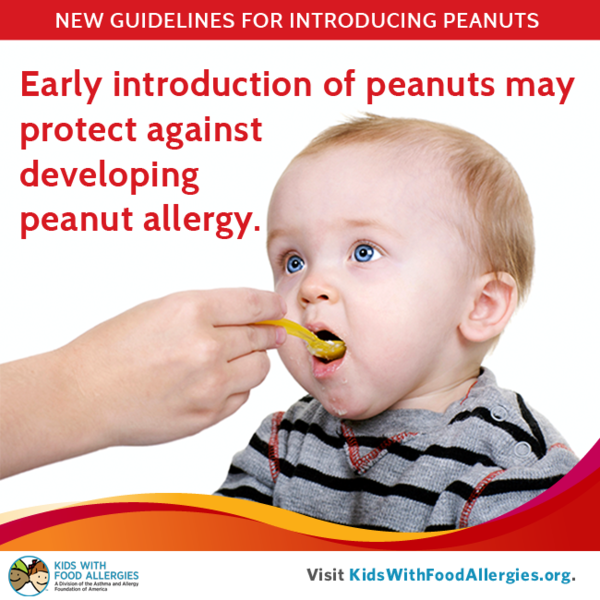Since February, the food allergy community has been waiting to see how – or if - a study hailed as a “landmark” would change recommendations about feeding young infants at risk for developing a peanut allergy.
This week, interim guidelines are being released, giving doctors some early advice on what to tell these families.
The Learning Early About Peanut Allergy study (LEAP study) found that early, rather than delayed, introduction of peanut may protect against developing peanut allergy.
Before 2008, parents were advised to wait until after age 3 to give their children peanuts if their child was considered high-risk. “High risk” is defined as children with a parent or sibling with an allergy.
In the LEAP study, 640 high-risk infants between the ages of 4 and 11 months were randomly put into two groups:
• those who would eat about 6 grams of peanut per week.
• those who would wait until age 5 to have it for the first time.
These infants were carefully tested and had their first bites of peanut in a doctor’s office. This is called an in-office food challenge.
Children who began eating peanuts as an infant had a nearly 70-80 percent lower rate of developing peanut allergy, compared to those who waited until they were age 5.
Early peanut introduction didn’t completely prevent peanut allergy from occurring in either group. However, the study made international news because the results of eating peanuts early were so positive.
New guidelines to doctors aim to sort out some of the confusion about how to use the study findings with patients.

The interim guidelines now say:
• The LEAP study provides strong evidence that feeding peanuts to babies between 4-11 months of age is appropriate if they are at high risk for developing an allergy. High risk is defined as having severe eczema and/or an existing food allergy (e.g. hen’s egg). Waiting to give peanut was associated with a higher rate of developing peanut allergy.
• Parents may want to take high-risk infants to see a board-certified allergist first. The allergist can then consider peanut allergy testing. Another thing an allergist can do is an in-office challenge with peanut.
• Children with lesser risk factors for peanut allergy were not part of the LEAP study. Parents of children at little risk for developing a peanut allergy are not advised to delay giving their children peanuts. This has been the case for several years already, and is not new.
• It is important to note that these guidelines do not apply to older children or those with existing peanut allergy. These only apply to infants who have never eaten peanut. People with existing food allergies must continue to carry epinephrine.
More formal recommendations are coming soon. These recommendations will better define “high-risk” and what (if any) pre-introduction steps are needed in these infants. The National Institutes of Allergy and Infectious Diseases (NIAID) expert panel will meet this summer to finalize these recommendations.
But this week’s news will help doctors make decisions and explain to families the potential benefits of starting certain infants on peanut early.
Kids With Food Allergies wants to repeat the point that these guidelines do not apply to children already diagnosed with peanut allergy. They also do not apply to children with suspected peanut allergy. If you suspect a peanut allergy, please find a board-certified allergist in your area for proper diagnosis and management. The allergist will also help you understand when to use epinephrine, the only treatment for anaphylaxis, a severe allergic reaction.
Reference:
Consensus Communication on Early Peanut Introduction and the Prevention of Peanut Allergy in High-Risk Infants. Retrieved online on June 3, 2015 from: http://www.aaaai.org/Aaaai/med...ion-Final-6-1-15.pdf
 Dr. Matthew Greenhawt, MBA, MSc, is a health services researcher whose goal is to produce work that will influence food allergy related healthcare policy. A national expert on in-flight allergic reactions to peanut and the safety of Influenza vaccine in egg-allergic recipients, he has published on a broad variety of food allergy-related topics. In addition to his work as an Assistant Professor in the Division of Allergy and Clinical Immunology at the University of Michigan Medical School, Dr. Greenhawt also serves as the Research Director for the University’s Food Allergy Center, and Co-Director of the University’s Combined Pediatric Eosinophilic Esophagitis Clinic. He is a member of several committees within the AAAAI and ACAAI, and is a member of the KFA Medical Advisory Team.
Dr. Matthew Greenhawt, MBA, MSc, is a health services researcher whose goal is to produce work that will influence food allergy related healthcare policy. A national expert on in-flight allergic reactions to peanut and the safety of Influenza vaccine in egg-allergic recipients, he has published on a broad variety of food allergy-related topics. In addition to his work as an Assistant Professor in the Division of Allergy and Clinical Immunology at the University of Michigan Medical School, Dr. Greenhawt also serves as the Research Director for the University’s Food Allergy Center, and Co-Director of the University’s Combined Pediatric Eosinophilic Esophagitis Clinic. He is a member of several committees within the AAAAI and ACAAI, and is a member of the KFA Medical Advisory Team.


Comments (5)